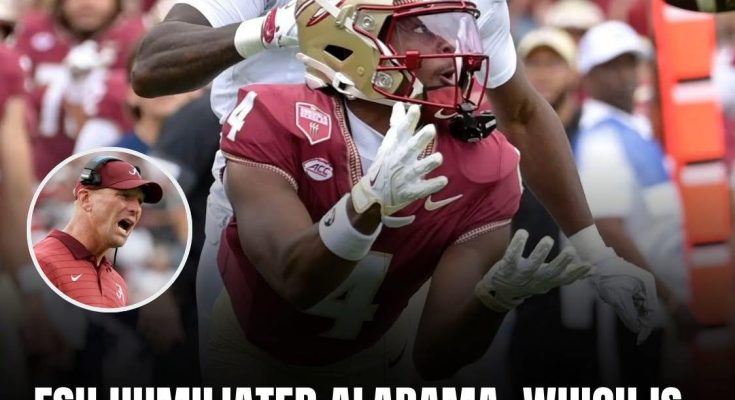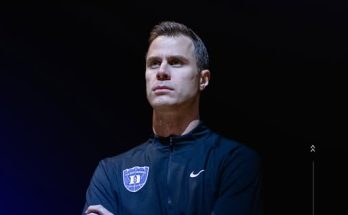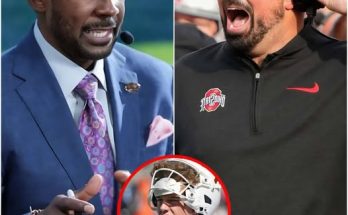Alabama football has always been synonymous with dominance, structure, and a level of consistency that most programs only dream about. For well over a decade, Nick Saban defined the modern era of college football by building not just championship teams, but a culture that revolved around relentless preparation, discipline, and a clear understanding of what it takes to win at the highest level. When Saban retired, there was no question that his successor would be scrutinized more than any other coach stepping into a new role. Kalen DeBoer came into Tuscaloosa with an impressive résumé, one that included his offensive genius and the way he elevated Washington into a College Football Playoff contender. Yet, from the moment Alabama suffered its first big loss under DeBoer, the whispers began to turn into conversations, and those conversations quickly snowballed into questions about whether he and his staff were truly ready for the unforgiving glare of the Alabama spotlight. The truth is, that loss did more than just dent Alabama’s season; it exposed weaknesses that fans and critics alike had suspected might appear, and it revealed how different the program feels compared to the airtight operation that existed under Saban.
When Alabama loses, it is never just another defeat. At most schools, a stumble in the first year under a new coach might be forgiven as part of the transition process, but not in Tuscaloosa. Alabama is judged by a different standard, one where every mistake feels magnified and every coaching decision dissected down to the smallest detail. DeBoer’s loss, and the way it unfolded, left many shaking their heads because it did not resemble the Alabama people had grown accustomed to. Instead of seeing a team that imposed its will physically, dictated tempo, and executed with machine-like precision, fans saw breakdowns in communication, lapses in discipline, and a staff that seemed unsure of its own identity. That alone was enough to spark concerns about whether DeBoer and his assistants fully grasped the enormity of the job they had taken on.
The exposure began with the basics. Alabama, for years, has prided itself on fundamentals—blocking, tackling, avoiding costly penalties, and winning the situational battles. Against top-tier opponents, those little details always made the difference. In DeBoer’s first major test, however, those details were glaringly absent. Missed assignments on both sides of the ball, poorly timed substitutions, and questionable play-calling decisions painted a picture of a team that was still trying to find its footing. This is not unusual for most programs during a transition year, but when you inherit the expectations of Alabama, even the smallest cracks look like massive fissures. Fans couldn’t help but feel that the loss exposed not just a lack of preparation for that game, but a deeper issue with how the new staff has approached building and molding the team.
One of the most telling aspects of the defeat was how Alabama seemed uncharacteristically soft in the trenches. Under Saban, the offensive and defensive lines were non-negotiable strengths. You could count on Alabama to dominate physically, even if the skill positions were still figuring things out. But against their opponent, Alabama looked overwhelmed at times, unable to protect the quarterback or consistently stop the run. That is not just a matter of personnel, though it’s true that DeBoer is working with a roster he did not entirely recruit. It is also about coaching philosophy, preparation, and the ability to adjust. Alabama fans are used to seeing halftime adjustments that flip games on their heads, yet in this contest, those adjustments never came. Instead, it felt as though Alabama continued to walk into the same mistakes over and over again. That’s why the criticism landed so heavily on DeBoer and his staff—because it was not just about a bad game, it was about what that bad game revealed.
The loss also highlighted something deeper: the culture shift. Every coach brings their own personality and style, and DeBoer’s calm, calculated demeanor is a stark contrast to Saban’s fiery presence. Some players thrive in a looser, more approachable environment, but there’s a real risk when that approach translates into a lack of urgency on the field. Against their opponent, Alabama looked like a team that was still figuring out how to play with that edge, that hunger, that refusal to be outworked. That is something you cannot simply scheme around; it has to be instilled daily. When a team like Alabama shows cracks in its mentality, that is often a reflection of leadership from the very top.
Critics were quick to point out that the staff seemed overwhelmed by the moment. Coordinators, who were supposed to bring fresh energy and modern ideas, instead struggled to adapt once things began spiraling. The offensive game plan at times felt predictable, failing to maximize the talent on the roster, while the defense looked reactive instead of aggressive. At Alabama, coaches are expected to not only match wits with the best in the nation but to outthink and outmaneuver them. For the first time in a long time, it looked like Alabama’s sideline was the one being outcoached. That is why so many people are asking the hard questions about whether DeBoer’s staff truly has what it takes to carry the mantle of a dynasty that Saban built.
Of course, perspective matters. This is still the first year under a new head coach, and it is unfair to expect perfection right away. Even Saban, in his early Alabama days, had to suffer through growing pains before building a juggernaut. But the difference is that Alabama is no longer a program climbing the mountain—it is a program that has lived on the summit for years. Any slip, any sign of regression, feels catastrophic to a fan base that demands championships, not excuses. The loss did not simply hurt because it was a defeat; it hurt because it suggested that Alabama might be trending away from the standard they’ve set, and that terrifies those who bleed crimson.
The pressure moving forward is immense. DeBoer cannot afford to let this loss define him, but he also cannot afford to brush it aside as just another game. It is a wake-up call, one that must lead to honest reflection and immediate changes. The staff needs to reestablish fundamentals, prioritize discipline, and find ways to reignite the relentless mentality that Alabama football has always been about. The margin for error is razor-thin in Tuscaloosa, and fans will not be patient if they sense that the program is slipping. DeBoer’s reputation as a brilliant offensive mind remains intact, but being the head coach at Alabama is not about one side of the ball—it is about embodying an entire culture and ensuring that every assistant, every player, and every detail is aligned with excellence.
What makes this situation fascinating is the ongoing conversation it sparks among fans and analysts. Was this loss simply the product of an inevitable adjustment period, or was it a sign of deeper structural issues that could haunt Alabama in the years to come? Should fans be patient with DeBoer as he puts his stamp on the program, or should they hold him to the immediate standard that comes with inheriting one of the greatest dynasties in sports? These are not easy questions, and the answers may not come for several seasons. But what is clear is that Alabama’s aura of invincibility has been shaken, and it is up to DeBoer and his staff to prove they are capable of restoring it.
In the end, one loss does not define a career, but at Alabama, it can certainly define perceptions. Kalen DeBoer is a talented coach with a proven track record, but this is no longer Washington or any other stop in his career. This is Alabama, where every flaw is magnified and every decision carries the weight of a program that millions invest their identity in. That is why his first major loss felt so exposing—it was not just about the scoreboard, but about what it revealed in the DNA of the team. Now comes the true test: how does DeBoer respond? Will he and his staff show that they can learn, adapt, and grow under the crushing expectations of Alabama football, or will this loss be remembered as the first crack in an empire that begins to crumble?
As fans and followers, your perspective matters. Do you think Alabama’s loss was just part of the natural growing pains of a new coaching staff, or do you believe it exposed something far more troubling about Kalen DeBoer and his ability to handle this role? Should the standard remain the same regardless of transition, or should Alabama fans give DeBoer more time to establish his vision? Share your thoughts, reactions, and debates in the comments—because the future of Alabama football is not just a story about one coach, it’s a conversation about what this program means and how it should evolve moving forward.



